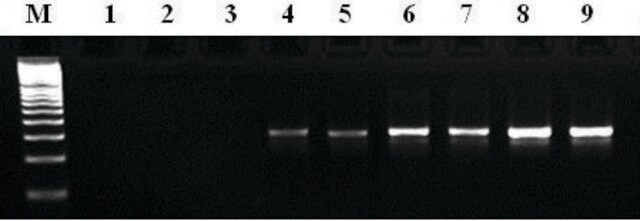D1806
Taq DNA Polymerase from Thermus aquaticus
with 10× PCR reaction buffer containing MgCl2
Synonym(s):
MgCl2 taq polymerase, Taq polymerase
About This Item
Recommended Products
biological source
enzyme from bacterial (Thermus Aquaticus)
recombinant
expressed in E. coli
form
liquid
usage
sufficient for 10000 reactions
sufficient for 3000 reactions
sufficient for 500 reactions
mol wt
94 kDa
feature
dNTPs included: no
hotstart: no
concentration
5 units/μL
technique(s)
PCR: suitable
color
colorless
input
purified DNA
suitability
suitable for PCR and automated sequencing reactions
application(s)
agriculture
shipped in
wet ice
storage temp.
−20°C
Looking for similar products? Visit Product Comparison Guide
Related Categories
General description
Application
- in the quantification of fungal growth by polymerase chain reaction (PCR) and photometric assay
- in conventional reverse transcriptase (RT)-PCR
- in simple sequence repeats (SSR) genotyping
- as a component of PCR mix for amplification of genomic and mitochondrial DNA
- in direct tetra-primer amplification refractory mutation system (T-ARMS) PCR to amplify dried whole blood samples
Biochem/physiol Actions
Features and Benefits
- Low per unit cost of Taq
Packaging
Other Notes
Unit Definition
Legal Information
related product
Storage Class Code
12 - Non Combustible Liquids
Regulatory Listings
Regulatory Listings are mainly provided for chemical products. Only limited information can be provided here for non-chemical products. No entry means none of the components are listed. It is the user’s obligation to ensure the safe and legal use of the product.
PDSCL
Please refer to KIT Component information
PRTR
Please refer to KIT Component information
FSL
Please refer to KIT Component information
ISHL Indicated Name
Please refer to KIT Component information
ISHL Notified Names
Please refer to KIT Component information
Cartagena Act
Please refer to KIT Component information
JAN Code
キットコンポーネントの情報を参照してください
Certificates of Analysis (COA)
Search for Certificates of Analysis (COA) by entering the products Lot/Batch Number. Lot and Batch Numbers can be found on a product’s label following the words ‘Lot’ or ‘Batch’.
Already Own This Product?
Find documentation for the products that you have recently purchased in the Document Library.
Customers Also Viewed
Articles
Explore PCR's history, from discovery to Nobel Prize. Discover real-time PCR (qPCR) and digital PCR developments.
Protocols
Hot Start dNTPs block DNA polymerase until heat activation, enhancing PCR specificity.
Learn standard PCR protocol steps and review reagent lists or cycling parameters. This method for routine PCR amplification of DNA uses standard Taq DNA polymerase.
Our team of scientists has experience in all areas of research including Life Science, Material Science, Chemical Synthesis, Chromatography, Analytical and many others.
Contact Technical Service












